Campus/People
-
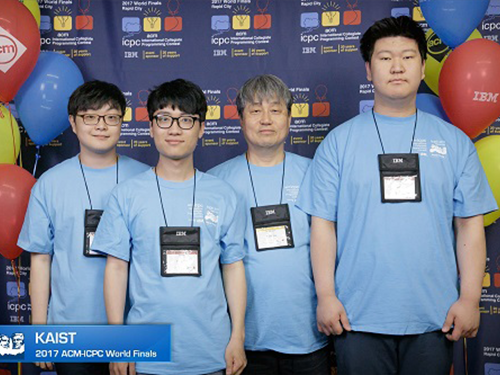 KAIST Team Wins Bronze Medal at Int'l Programming Contest
A KAIST Team consisting of undergraduate students from the School of Computing and Department of Mathematical Science received a bronze medal and First Problem Solver award at an international undergraduate programming competition, The Association for Computing Machinery-International Collegiate Programming Contest (ACM-ICPC) World Finals.
The 41st ACM-ICPC hosted by ACM and funded by IBM was held in South Dakota in the US on May 25. The competition, first held in 1977, is aimed at undergraduate students from around the world. A total of 50,000 students from 2900 universities and 103 countries participated in the regional competition and 400 students competed in the finals.
The competition required teams of three to solve 12 problems. The KAIST team was coached by Emeritus Professor Sung-Yong Shin and Professor Taisook Han. The student contestants were Jihoon Ko and Hanpil Kang from the School of Computing and Jongwoon Lee from the Department of Mathematical Science. The team finished ranked 9th, receiving a bronze medal and a $3000 prize. Additionally, the team was the first to solve all the problems and received the First Problem Solver award. Detailed score information can be found on. https://icpc.baylor.edu/scoreboard/
(Photo caption: Professor Taisook Han and his students)
2017.06.12 View 10544
KAIST Team Wins Bronze Medal at Int'l Programming Contest
A KAIST Team consisting of undergraduate students from the School of Computing and Department of Mathematical Science received a bronze medal and First Problem Solver award at an international undergraduate programming competition, The Association for Computing Machinery-International Collegiate Programming Contest (ACM-ICPC) World Finals.
The 41st ACM-ICPC hosted by ACM and funded by IBM was held in South Dakota in the US on May 25. The competition, first held in 1977, is aimed at undergraduate students from around the world. A total of 50,000 students from 2900 universities and 103 countries participated in the regional competition and 400 students competed in the finals.
The competition required teams of three to solve 12 problems. The KAIST team was coached by Emeritus Professor Sung-Yong Shin and Professor Taisook Han. The student contestants were Jihoon Ko and Hanpil Kang from the School of Computing and Jongwoon Lee from the Department of Mathematical Science. The team finished ranked 9th, receiving a bronze medal and a $3000 prize. Additionally, the team was the first to solve all the problems and received the First Problem Solver award. Detailed score information can be found on. https://icpc.baylor.edu/scoreboard/
(Photo caption: Professor Taisook Han and his students)
2017.06.12 View 10544 -
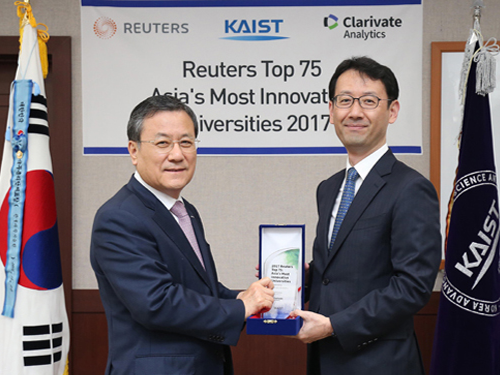 'KAIST the Most Innovative University in Asia-Pacific Region'
KAIST topped the most innovative universities ranking in the Asia and Pacific region for the second year in a row in 2017. Thomson Reuters released the second annual ranking of the Asia Pacific regions’ most innovative universities, a list that ranks the top 75 educational institutions doing the most to advance science and invent new technologies.
KAIST earned first place by producing a high volume of influential inventions. KAIST researchers submitted 923 patent filings from 2010 to 2015 and was the most cited in research papers, taking first place out of 75 top-ranked universities in the Asia and Pacific region. Those are key criteria in the rankings compiled in partnership with Clarivate Analytics. The Clarivate Analytics evaluates the institutions on 10 different metrics, focusing on academic paper citations and patent filings.
South Korean universities filled four out of the top five spots in the rankings and eight of the top 20 on the 2017 list. A total of 22 Korean universities were on the list of the top 75. Meanwhile 25 Chinese universities including Hong Kong, and 18 Japanese universities were listed in the rankings.
(Photo caption: Dr. Justin Kim (right), regional director of Clarivate Analytics Korea presents the plaque of the Most Innovative Univerisites in 2017 in Asia-Pacific region to President Sung-Chul Shin on June 15.)
2017.06.12 View 4923
'KAIST the Most Innovative University in Asia-Pacific Region'
KAIST topped the most innovative universities ranking in the Asia and Pacific region for the second year in a row in 2017. Thomson Reuters released the second annual ranking of the Asia Pacific regions’ most innovative universities, a list that ranks the top 75 educational institutions doing the most to advance science and invent new technologies.
KAIST earned first place by producing a high volume of influential inventions. KAIST researchers submitted 923 patent filings from 2010 to 2015 and was the most cited in research papers, taking first place out of 75 top-ranked universities in the Asia and Pacific region. Those are key criteria in the rankings compiled in partnership with Clarivate Analytics. The Clarivate Analytics evaluates the institutions on 10 different metrics, focusing on academic paper citations and patent filings.
South Korean universities filled four out of the top five spots in the rankings and eight of the top 20 on the 2017 list. A total of 22 Korean universities were on the list of the top 75. Meanwhile 25 Chinese universities including Hong Kong, and 18 Japanese universities were listed in the rankings.
(Photo caption: Dr. Justin Kim (right), regional director of Clarivate Analytics Korea presents the plaque of the Most Innovative Univerisites in 2017 in Asia-Pacific region to President Sung-Chul Shin on June 15.)
2017.06.12 View 4923 -
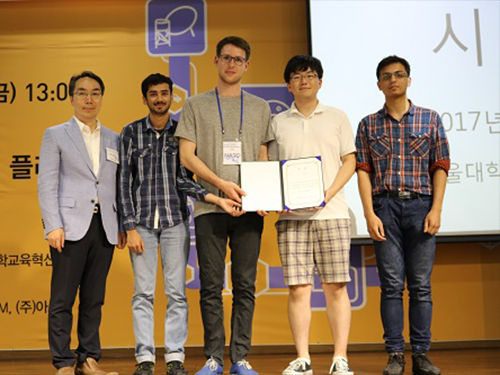 KATT Tops at Appropriate Technology Competition
The KAIST Appropriate Technology Team (KATT) consisting of KAIST international students received gold and bronze awards at ‘the 9th Creative Design Competition for the Other 90%’. This year’s competition was hosted by the Ministry of Science, ICT and Future Planning at Seoul National University’s Global Convention Plaza on May 26. Undergraduate and graduate students nationwide formed 65 teams to participate in the competition.
The aim of the competition is to discover appropriate technology and sustainable design items to enhance quality of life for those with no or little access to science technology and its products around the world. This year’s competition categorized the designs into IT; water and energy; agriculture, hygiene, safety, and housing; and education. The teams were evaluated on their presentations and prototypes.
KATT produced alarm warning bracelets for people in developing countries and smart hybrid dryers for agricultural products. The alarm warning bracelets were designed for those living in tsunami risk zones; they use wireless communication technology to receive and transmit warning signals and can be produced for less than $4.
The smart hybrid dryers featured solar energy generation, aimed to help those with low income in subtropical, low-altitude regions with unstable climates, since there are currently no drying methods for agricultural products without direct exposure to sunlight. Therefore, the hybrid dryers allowed drying regardless of the weather, and thus increased the storage and distribution efficiency of agricultural products.
Ashar Alam from India who participated in developing the alarm warning bracelet said, “Through the appropriate technology club, I recognized problems in India that also affect neighboring countries such as Indonesia and Bangladesh. I wanted to actively use the science and technology knowledge I have accumulated in KAIST for the less fortunate.” He continued, “It was meaningful to develop the product using the respective talents of students from various countries with the spirit of developing appropriate technology.”
(Photo caption: Alarm warning bracelet team received the gold award)
2017.06.12 View 8434
KATT Tops at Appropriate Technology Competition
The KAIST Appropriate Technology Team (KATT) consisting of KAIST international students received gold and bronze awards at ‘the 9th Creative Design Competition for the Other 90%’. This year’s competition was hosted by the Ministry of Science, ICT and Future Planning at Seoul National University’s Global Convention Plaza on May 26. Undergraduate and graduate students nationwide formed 65 teams to participate in the competition.
The aim of the competition is to discover appropriate technology and sustainable design items to enhance quality of life for those with no or little access to science technology and its products around the world. This year’s competition categorized the designs into IT; water and energy; agriculture, hygiene, safety, and housing; and education. The teams were evaluated on their presentations and prototypes.
KATT produced alarm warning bracelets for people in developing countries and smart hybrid dryers for agricultural products. The alarm warning bracelets were designed for those living in tsunami risk zones; they use wireless communication technology to receive and transmit warning signals and can be produced for less than $4.
The smart hybrid dryers featured solar energy generation, aimed to help those with low income in subtropical, low-altitude regions with unstable climates, since there are currently no drying methods for agricultural products without direct exposure to sunlight. Therefore, the hybrid dryers allowed drying regardless of the weather, and thus increased the storage and distribution efficiency of agricultural products.
Ashar Alam from India who participated in developing the alarm warning bracelet said, “Through the appropriate technology club, I recognized problems in India that also affect neighboring countries such as Indonesia and Bangladesh. I wanted to actively use the science and technology knowledge I have accumulated in KAIST for the less fortunate.” He continued, “It was meaningful to develop the product using the respective talents of students from various countries with the spirit of developing appropriate technology.”
(Photo caption: Alarm warning bracelet team received the gold award)
2017.06.12 View 8434 -
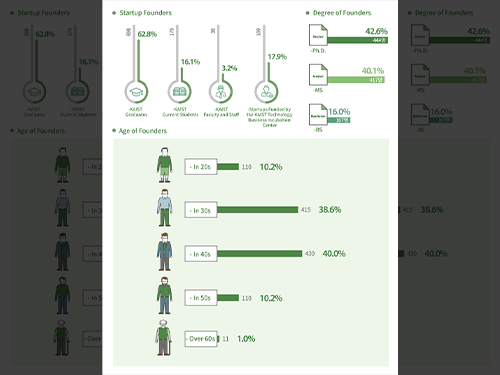 KAIST Alumni Take a Strong Hold on Tech-Based Startups
Average sales for KAIST alumni startups in 2015 doubled from the previous year to 20.7 billion KRW. They reportedly recorded approximately 37-times higher sales than non-KAIST alumni startups, demonstrating that KAIST is emerging as strong tech-based venture startup incubator.
According to a white paper on the Profile and Performance of KAIST Startups released recently, the number of KAIST startups stood 1,112, of which 877 were founded by alumni (78.9%), 36 by faculty and staff (3.2%), and 199 by those funded by the KAIST Technology Business Incubation Center (17.9%) at the end of 2015.
The total sales of KAIST startups stood at 13.6 trillion KRW in 2015, a 25% increase compared to the previous year. KAIST alumni startups created about 32,400 jobs in that year.
Most KAIST founders majored in engineering (649 people, 71.1%), followed by business (121 people, 13.3%), natural sciences (86, 9.4%), life science and bio engineering (32 people, 3.5%), and liberal arts and convergence science (24 people, 2.6%), making a total of 913 founders, excluding the 199 startups funded by KAIST Technology Business Incubation Center.
By department, most founders come from electrical engineering (148 people, 16.2%), followed by mechanical engineering (135 people, 14.8%), and computer science (114 people, 12.5%).
KAIST startups produced 63 listed companies (1 KOSPI, 51 KOSDAQ, and 11 KONEX), which accounted for 5.7% of the total 1112 startups. This is significantly higher than the average for venture companies (1.1%). It should be noted that the rate is only around 10% for Korean conglomerate-affiliated companies.
At the point of startup establishment, KAIST alumni startup founders were mostly in their 40s (430 people, 40%), followed by their 30s (415 people, 38.6%), 20s (110 people, 10.2%) and 50s (110 people, 10.2%). Around half of the founders were in their 20s and 30s. In particular, the number of founders in their 20s and 30s was around 3.5 times higher in KAIST startups compared to general startups and 1.2 times higher than venture startups.
The average lifespan of KAIST startups is 10.3 years; 276 companies (25%) were established over 16 years ago, 282 companies (25.4%) between 6 and 10 years, 246 companies (22.1%) between 11 and 15 years, and 308 companies (27.7%) less than five years ago. By type of business, startups based on technology accounted for 88.1%; 510 manufacturing companies accounted for 46.2%, followed by 321 information service companies with 29.1%, and 147 science and technology service companies with 13.3%.
By region, 617 companies (55.5%) were located in Seoul and the nearby metropolitan area, followed by 350 companies (31.5%) located in Daejeon.
2017.05.30 View 6609
KAIST Alumni Take a Strong Hold on Tech-Based Startups
Average sales for KAIST alumni startups in 2015 doubled from the previous year to 20.7 billion KRW. They reportedly recorded approximately 37-times higher sales than non-KAIST alumni startups, demonstrating that KAIST is emerging as strong tech-based venture startup incubator.
According to a white paper on the Profile and Performance of KAIST Startups released recently, the number of KAIST startups stood 1,112, of which 877 were founded by alumni (78.9%), 36 by faculty and staff (3.2%), and 199 by those funded by the KAIST Technology Business Incubation Center (17.9%) at the end of 2015.
The total sales of KAIST startups stood at 13.6 trillion KRW in 2015, a 25% increase compared to the previous year. KAIST alumni startups created about 32,400 jobs in that year.
Most KAIST founders majored in engineering (649 people, 71.1%), followed by business (121 people, 13.3%), natural sciences (86, 9.4%), life science and bio engineering (32 people, 3.5%), and liberal arts and convergence science (24 people, 2.6%), making a total of 913 founders, excluding the 199 startups funded by KAIST Technology Business Incubation Center.
By department, most founders come from electrical engineering (148 people, 16.2%), followed by mechanical engineering (135 people, 14.8%), and computer science (114 people, 12.5%).
KAIST startups produced 63 listed companies (1 KOSPI, 51 KOSDAQ, and 11 KONEX), which accounted for 5.7% of the total 1112 startups. This is significantly higher than the average for venture companies (1.1%). It should be noted that the rate is only around 10% for Korean conglomerate-affiliated companies.
At the point of startup establishment, KAIST alumni startup founders were mostly in their 40s (430 people, 40%), followed by their 30s (415 people, 38.6%), 20s (110 people, 10.2%) and 50s (110 people, 10.2%). Around half of the founders were in their 20s and 30s. In particular, the number of founders in their 20s and 30s was around 3.5 times higher in KAIST startups compared to general startups and 1.2 times higher than venture startups.
The average lifespan of KAIST startups is 10.3 years; 276 companies (25%) were established over 16 years ago, 282 companies (25.4%) between 6 and 10 years, 246 companies (22.1%) between 11 and 15 years, and 308 companies (27.7%) less than five years ago. By type of business, startups based on technology accounted for 88.1%; 510 manufacturing companies accounted for 46.2%, followed by 321 information service companies with 29.1%, and 147 science and technology service companies with 13.3%.
By region, 617 companies (55.5%) were located in Seoul and the nearby metropolitan area, followed by 350 companies (31.5%) located in Daejeon.
2017.05.30 View 6609 -
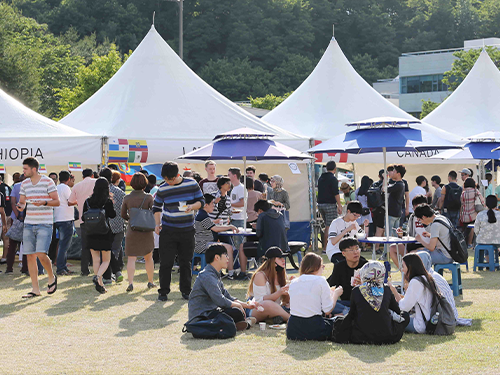 The 2017 International Food Festival
The savory smell of exotic dishes filled the main plaza of the KAIST campus on May 26. Exotic music reverberated throughout the campus. The KAIST community took a break together on a breezy early summer Friday afternoon sharing food with their friends and family. KAIST international student body, KISA (KAIST International Students Association), installed white food tents and prepared their country’s favorite dishes at their 13th annual International Food Festival.
The festival was co-organized with Chungnam National University and the University of Science & Technology (UST). At the festival, students from 18 nations cooked about 60 dishes and sold them to the public. Foreign students’ performances of traditional dance and music on the stage livened the atmosphere.
KISA President Sanzhar Kerimbek of the Department of Chemical and Biomolecular Engineering said, “We are so glad to show the diversity of KAIST and its rich culture. This is a big opportunity to get together with neighboring universities, CNU and UST and say thank you for their participation and support." Valentin Porcellini, an exchange students from France in the School of Computing, said, “We are so excited to have people taste our crepes, ratatouille, and other dishes.”
Associate Vice President of the International Office Jay Hyung Lee also said he was glad to see so many people joining this festival. While congratulating the students on the success of the festival, he said the festival will serve as an opportunity to better understand each other by sharing the food and culture.
(Photo caption: Paricipants stop by the Indonesian booth to purchase the food at the International Food Festival on May 26.)
2017.05.29 View 6302
The 2017 International Food Festival
The savory smell of exotic dishes filled the main plaza of the KAIST campus on May 26. Exotic music reverberated throughout the campus. The KAIST community took a break together on a breezy early summer Friday afternoon sharing food with their friends and family. KAIST international student body, KISA (KAIST International Students Association), installed white food tents and prepared their country’s favorite dishes at their 13th annual International Food Festival.
The festival was co-organized with Chungnam National University and the University of Science & Technology (UST). At the festival, students from 18 nations cooked about 60 dishes and sold them to the public. Foreign students’ performances of traditional dance and music on the stage livened the atmosphere.
KISA President Sanzhar Kerimbek of the Department of Chemical and Biomolecular Engineering said, “We are so glad to show the diversity of KAIST and its rich culture. This is a big opportunity to get together with neighboring universities, CNU and UST and say thank you for their participation and support." Valentin Porcellini, an exchange students from France in the School of Computing, said, “We are so excited to have people taste our crepes, ratatouille, and other dishes.”
Associate Vice President of the International Office Jay Hyung Lee also said he was glad to see so many people joining this festival. While congratulating the students on the success of the festival, he said the festival will serve as an opportunity to better understand each other by sharing the food and culture.
(Photo caption: Paricipants stop by the Indonesian booth to purchase the food at the International Food Festival on May 26.)
2017.05.29 View 6302 -
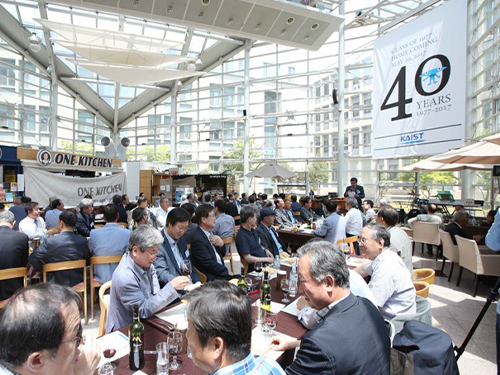 KAIST Class of '77 Celebrates 40-Year Reunion
The class of 1977 reunited on April 20 at the College of Business in Seoul campus, which was once the main campus when they were students 40 years ago. Now leaders of Korea in the sectors of industry, academia, and research, the class of ‘77 held a homecoming event in celebration of the 40th anniversary of their graduation.
The class of ’77 includes KAIST President Sung-Chul Shin and the Minister of Science, ICT and Future Planning Yanghee Choi. More than 100 graduates and 20 professors gathered at the homecoming event. Many of them were former ministers of science and technology, presidents of universities, heads of research institutes, and top managers from leading corporations such as Samsung Electronics and SK Telecom in Korea.
At the event, Professor Dong-Hoon Choi at Hangyang University, representing alumni Yoon-Mo Koo, Oh-Hyun Kwon, Dae-Young Kim, Yoo-Hyun Moon, Nam-Ho Paik, Ki Hwang Baek, Sung-Chul Shin, Mann-Ho Lee, and Sang-Bum Lee, donated a scholarship of 100 million KRW. Professor Choi said that, “This may not be a large sum of money, but we raised it with grateful hearts for the country and for KAIST. I hope this scholarship will become a small seed to raise bigger fruit.”
President Shin reminisced that, “The achievements made at KAIST during the last half century were only possible due to the dreams, visions, and innovative ideas of those who established KAIST, and the passion for research, education, and learning of our former professors and students.”
President Shin continued, “KAIST was the light of hope in the early industrialization period in Korea half a century ago, and as alumnus president I will devote body and soul for KAIST to be the light of hope in the early stages of the Industry 4.0, and thus continue to be the light of hope for the future of Korea.”
Notable guests presented include Former Minister of Science and Technology and former Provost of KAIST Kun-Mo Chung, Former Minister of Communications and former Professor Soon-Hoon Bae, Vice Chairman and CEO for Samsung Electronics Oh-Hyun Kwon, SK Telecom ICT President for Technology Ho-Soo Lee; President of Yeungnam University Gil Soo Sur; former President of the University of Seoul Sang-Bum Lee; President of the Korea Research Institute of Chemical Technology Kew-Ho Lee; and former President of the Korea Research Institute of Bioscience and Biotechnology Sang-Ki Rhee.
2017.05.23 View 6896
KAIST Class of '77 Celebrates 40-Year Reunion
The class of 1977 reunited on April 20 at the College of Business in Seoul campus, which was once the main campus when they were students 40 years ago. Now leaders of Korea in the sectors of industry, academia, and research, the class of ‘77 held a homecoming event in celebration of the 40th anniversary of their graduation.
The class of ’77 includes KAIST President Sung-Chul Shin and the Minister of Science, ICT and Future Planning Yanghee Choi. More than 100 graduates and 20 professors gathered at the homecoming event. Many of them were former ministers of science and technology, presidents of universities, heads of research institutes, and top managers from leading corporations such as Samsung Electronics and SK Telecom in Korea.
At the event, Professor Dong-Hoon Choi at Hangyang University, representing alumni Yoon-Mo Koo, Oh-Hyun Kwon, Dae-Young Kim, Yoo-Hyun Moon, Nam-Ho Paik, Ki Hwang Baek, Sung-Chul Shin, Mann-Ho Lee, and Sang-Bum Lee, donated a scholarship of 100 million KRW. Professor Choi said that, “This may not be a large sum of money, but we raised it with grateful hearts for the country and for KAIST. I hope this scholarship will become a small seed to raise bigger fruit.”
President Shin reminisced that, “The achievements made at KAIST during the last half century were only possible due to the dreams, visions, and innovative ideas of those who established KAIST, and the passion for research, education, and learning of our former professors and students.”
President Shin continued, “KAIST was the light of hope in the early industrialization period in Korea half a century ago, and as alumnus president I will devote body and soul for KAIST to be the light of hope in the early stages of the Industry 4.0, and thus continue to be the light of hope for the future of Korea.”
Notable guests presented include Former Minister of Science and Technology and former Provost of KAIST Kun-Mo Chung, Former Minister of Communications and former Professor Soon-Hoon Bae, Vice Chairman and CEO for Samsung Electronics Oh-Hyun Kwon, SK Telecom ICT President for Technology Ho-Soo Lee; President of Yeungnam University Gil Soo Sur; former President of the University of Seoul Sang-Bum Lee; President of the Korea Research Institute of Chemical Technology Kew-Ho Lee; and former President of the Korea Research Institute of Bioscience and Biotechnology Sang-Ki Rhee.
2017.05.23 View 6896 -
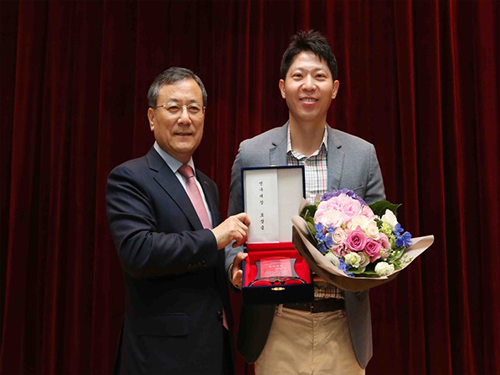 2017 KAIST Research Day Honors Professor Hoon Sohn
The 2017 KAIST Research Day recognized Professor Hoon Sohn of the Department of Civil and Environmental Engineering as Research Grand Prize Awardee in addition to the 10 most distinguished research achievements of the past year.
The Research Grand Prize recognizes the professor whose comprehensive research performance evaluation indicator is the highest over the past five years. The indicator combines the factors of the number of research contracts, IPR, royalty income, as well as research overhead cost inclusion.
During the ceremony, which was held on May 23, Professor Jun-Ho Oh of the Department of Mechanical Engineering and Professor Sang Yup Lee of the Department of Chemical and Biomolecular Engineering also won the Best Research Award. The two professors had the best scores when evaluating their research performance for one-year periods.
Meanwhile, the Research Innovation Award went to Professor YongKeun Park of the Department of Physics. The Research Innovation Award scores the factors of foreign patent registration, contracts of technological transfer and income from technology fees, technology consultations, and startups and selected Professor Park as the top winner.
Professors Yong Hee Lee of the Department of Physics and Jonghwa Shin of the Department of Material Science won the Convergence Research Award. The Convergence Research Award recognizes the most outstanding research team who created innovative research results for a year.
After the ceremony, President Chen Shiyi of the Southern University of Science and Technology gave a distinguished lecture on the “Global & Entrepreneurial Universities for the Age of the Fourth Industrial Revolution.” the Research Day ceremony, KAIST also presented the ten most distinguished research achievements made by KAIST professors during the last year as follows (Click):
▲ Commercialization of 3D Holographic Microscopy by Professor YongKeun Park of the Department of Physics
▲ Designer Proteins with Chemical Modifications by Professor Hee-Sung Park of the Department of Chemistry
▲ Lanthanum-Catalyzed Synthesis of Microporous 3D Graphene-Like Carbons in a Zeolite Template by Professor Ryong Ryoo of the Department of Chemistry
▲ Complete Prevention of Blood Loss by Self-Sealing Hemostatic Needles by Professor Haeshin Lee of the Department of Chemistry
▲ An Immunological Mechanism for the Contribution of Commensal Microbiota Against Herpes Simplex Virus Infection in Genital Mucosa by Heung Kyu Lee of the Graduate School of Medical Science and Engineering
▲ Development of a Pulse-Echo Laser Ultrasonic Propagation Imaging System by Professor Jung-Ryul Lee of the Department of Aerospace Engineering
▲ Bi-refractive Stereo Imaging for Single-Shot Depth Acquisition by Professor Min H. Kim of the School of Computing
▲ Development of Environment Friendly Geotechnical Construction Material Using Biopolymer by Professor Gye-Chun Cho of the Department of Civil and Environmental Engineering
▲ Protein Delivery Via Engineered Exosomes by Professor Chulhee Choi of the Department of Bio and Brain Engineering
▲ Hot Electron Detection Under Catalytic Reactions by Professor Jeong Young Park of the Graduate School of EEWS.
After the ceremony, President Chen Shiyi of the Southern University of Science and Technology gave a distinguished lecture on the “Global & Entrepreneurial Universities for the Age of the Fourth Industrial Revolution.”
(Photo:President Shin poses with the 2017 KAIST Research Grand Prize Winner Professor Hoon Sohn on May 23.)
2017.05.23 View 14489
2017 KAIST Research Day Honors Professor Hoon Sohn
The 2017 KAIST Research Day recognized Professor Hoon Sohn of the Department of Civil and Environmental Engineering as Research Grand Prize Awardee in addition to the 10 most distinguished research achievements of the past year.
The Research Grand Prize recognizes the professor whose comprehensive research performance evaluation indicator is the highest over the past five years. The indicator combines the factors of the number of research contracts, IPR, royalty income, as well as research overhead cost inclusion.
During the ceremony, which was held on May 23, Professor Jun-Ho Oh of the Department of Mechanical Engineering and Professor Sang Yup Lee of the Department of Chemical and Biomolecular Engineering also won the Best Research Award. The two professors had the best scores when evaluating their research performance for one-year periods.
Meanwhile, the Research Innovation Award went to Professor YongKeun Park of the Department of Physics. The Research Innovation Award scores the factors of foreign patent registration, contracts of technological transfer and income from technology fees, technology consultations, and startups and selected Professor Park as the top winner.
Professors Yong Hee Lee of the Department of Physics and Jonghwa Shin of the Department of Material Science won the Convergence Research Award. The Convergence Research Award recognizes the most outstanding research team who created innovative research results for a year.
After the ceremony, President Chen Shiyi of the Southern University of Science and Technology gave a distinguished lecture on the “Global & Entrepreneurial Universities for the Age of the Fourth Industrial Revolution.” the Research Day ceremony, KAIST also presented the ten most distinguished research achievements made by KAIST professors during the last year as follows (Click):
▲ Commercialization of 3D Holographic Microscopy by Professor YongKeun Park of the Department of Physics
▲ Designer Proteins with Chemical Modifications by Professor Hee-Sung Park of the Department of Chemistry
▲ Lanthanum-Catalyzed Synthesis of Microporous 3D Graphene-Like Carbons in a Zeolite Template by Professor Ryong Ryoo of the Department of Chemistry
▲ Complete Prevention of Blood Loss by Self-Sealing Hemostatic Needles by Professor Haeshin Lee of the Department of Chemistry
▲ An Immunological Mechanism for the Contribution of Commensal Microbiota Against Herpes Simplex Virus Infection in Genital Mucosa by Heung Kyu Lee of the Graduate School of Medical Science and Engineering
▲ Development of a Pulse-Echo Laser Ultrasonic Propagation Imaging System by Professor Jung-Ryul Lee of the Department of Aerospace Engineering
▲ Bi-refractive Stereo Imaging for Single-Shot Depth Acquisition by Professor Min H. Kim of the School of Computing
▲ Development of Environment Friendly Geotechnical Construction Material Using Biopolymer by Professor Gye-Chun Cho of the Department of Civil and Environmental Engineering
▲ Protein Delivery Via Engineered Exosomes by Professor Chulhee Choi of the Department of Bio and Brain Engineering
▲ Hot Electron Detection Under Catalytic Reactions by Professor Jeong Young Park of the Graduate School of EEWS.
After the ceremony, President Chen Shiyi of the Southern University of Science and Technology gave a distinguished lecture on the “Global & Entrepreneurial Universities for the Age of the Fourth Industrial Revolution.”
(Photo:President Shin poses with the 2017 KAIST Research Grand Prize Winner Professor Hoon Sohn on May 23.)
2017.05.23 View 14489 -
 2017 ICISTS Conference 'Draw the Web: Interactions in Society'
The KAIST undergraduate organization, ICISTS (International Conference for Integration of Science, Technology and Society) will convene its annual conference from July 31 to Aug. 4 at the KAIST Daejeon Campus. This year’s theme is “Draw the Web: Interactions in Society.” More than 300 participants from 60 universities in 20 countries will participate in the international conference hosted and planned by the student organization.
Speakers at the 2017 conference include leaders in technology, business, investment, and entrepreneurship, and many others highlighted by Christoffer O. Hernæs, chief digital officer of Skandiabanken and vice president of strategy and innovation at Sparebank; Vincent C. Müller, professor of the philosophy division of humanities & social sciences at Anatolia College; Nigel Parker, director of developer and platform evangelism at Microsoft APAC; and Jon Gosier, founder and CEO of WoundedMetrics, who was voted as one of the 25 most influential African-Americans in technology by Business Insider in 2013 and 2014.
ICISTS has organized and hosted this event, the largest academic conference hosted and organized by students in Asia, since 2005 as a way to discuss an incredibly challenging issue: how science and technology is being integrated into society. This year’s conference will explore how prominent technological advancements are integrated, and how the interactions between humanity and technology will affect society. This year’s sub-theme is “Settlement, Movement, and Inequality.”
In addition to the main session, ICISTS is preparing discussion sessions in which guest speakers and participants will divide into small groups to discuss their responses to the themes. Various additional events including a culture night and an excursion program will serve as opportunities to network with other participants. For more information on the program and how to register, please visit http://www.icist.org.
2017.05.22 View 8795
2017 ICISTS Conference 'Draw the Web: Interactions in Society'
The KAIST undergraduate organization, ICISTS (International Conference for Integration of Science, Technology and Society) will convene its annual conference from July 31 to Aug. 4 at the KAIST Daejeon Campus. This year’s theme is “Draw the Web: Interactions in Society.” More than 300 participants from 60 universities in 20 countries will participate in the international conference hosted and planned by the student organization.
Speakers at the 2017 conference include leaders in technology, business, investment, and entrepreneurship, and many others highlighted by Christoffer O. Hernæs, chief digital officer of Skandiabanken and vice president of strategy and innovation at Sparebank; Vincent C. Müller, professor of the philosophy division of humanities & social sciences at Anatolia College; Nigel Parker, director of developer and platform evangelism at Microsoft APAC; and Jon Gosier, founder and CEO of WoundedMetrics, who was voted as one of the 25 most influential African-Americans in technology by Business Insider in 2013 and 2014.
ICISTS has organized and hosted this event, the largest academic conference hosted and organized by students in Asia, since 2005 as a way to discuss an incredibly challenging issue: how science and technology is being integrated into society. This year’s conference will explore how prominent technological advancements are integrated, and how the interactions between humanity and technology will affect society. This year’s sub-theme is “Settlement, Movement, and Inequality.”
In addition to the main session, ICISTS is preparing discussion sessions in which guest speakers and participants will divide into small groups to discuss their responses to the themes. Various additional events including a culture night and an excursion program will serve as opportunities to network with other participants. For more information on the program and how to register, please visit http://www.icist.org.
2017.05.22 View 8795 -
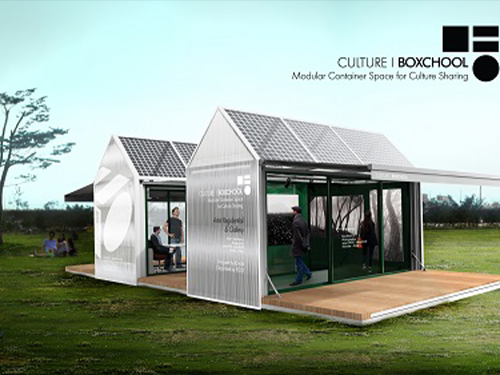 Prof. Sang-Min Bae Receives 2017 iF Design Award
Prof. Sang-Min Bae and his research team from the Industrial Design Department of KAIST submitted a winning entry to the 2017 iF Design Award named ‘Culture BOXCHOOL’.
The iF Design Award is an internationally renowned design contest that is recognized as one of the top three design awards in the world along with the Red Dot Design Award and the IDEA Design Award. It has been held annually by iF International Forum Design since 1953. A total of 5,575 entries from 59 countries entered the last competition.
Culture BOXCHOOL is a modular container space platform designed for culture sharing in isolated areas. It is delivered as a standard shipping container along with its subsidiary modular parts and it transforms into a gallery, office, or classroom. These modular parts build the interior and exterior by attaching them to the corner castings, which are standard parts on all shipping containers. Two Cultural BOXCHOOL containers can be transformed into three different types of layouts.
The containers can generate their own energy using solar panels that provide sustainable energy to equipment inside. Additionally, hot humid air can flow out through the attic vent, doors, and windows.
“With Culture BOXCHOOL, you can easily and quickly create spaces such as offices and classrooms, or you can easily disassemble and move them to another location.
Thus, it can provide everyone with equal educational opportunities and cultural enjoyment regardless of their geographical location. In addition, because it produces its own energy, it is expected to create a cultural space in a relatively harsh environment such as in developing countries. These social and economic values of Culture BOXCHOOL seem to be what led to us winning the contest. I will continue to strive to create the world’s best designs for needy people.” Professor Bae said.
The ID+IM design laboratory, a research team led by Professor Bae, has been studying philanthropy design since 2005, working on solving various problems throughout society through innovative design. They have received more than 50 awards from the most prestigious design competitions in the world.
2017.05.18 View 8974
Prof. Sang-Min Bae Receives 2017 iF Design Award
Prof. Sang-Min Bae and his research team from the Industrial Design Department of KAIST submitted a winning entry to the 2017 iF Design Award named ‘Culture BOXCHOOL’.
The iF Design Award is an internationally renowned design contest that is recognized as one of the top three design awards in the world along with the Red Dot Design Award and the IDEA Design Award. It has been held annually by iF International Forum Design since 1953. A total of 5,575 entries from 59 countries entered the last competition.
Culture BOXCHOOL is a modular container space platform designed for culture sharing in isolated areas. It is delivered as a standard shipping container along with its subsidiary modular parts and it transforms into a gallery, office, or classroom. These modular parts build the interior and exterior by attaching them to the corner castings, which are standard parts on all shipping containers. Two Cultural BOXCHOOL containers can be transformed into three different types of layouts.
The containers can generate their own energy using solar panels that provide sustainable energy to equipment inside. Additionally, hot humid air can flow out through the attic vent, doors, and windows.
“With Culture BOXCHOOL, you can easily and quickly create spaces such as offices and classrooms, or you can easily disassemble and move them to another location.
Thus, it can provide everyone with equal educational opportunities and cultural enjoyment regardless of their geographical location. In addition, because it produces its own energy, it is expected to create a cultural space in a relatively harsh environment such as in developing countries. These social and economic values of Culture BOXCHOOL seem to be what led to us winning the contest. I will continue to strive to create the world’s best designs for needy people.” Professor Bae said.
The ID+IM design laboratory, a research team led by Professor Bae, has been studying philanthropy design since 2005, working on solving various problems throughout society through innovative design. They have received more than 50 awards from the most prestigious design competitions in the world.
2017.05.18 View 8974 -
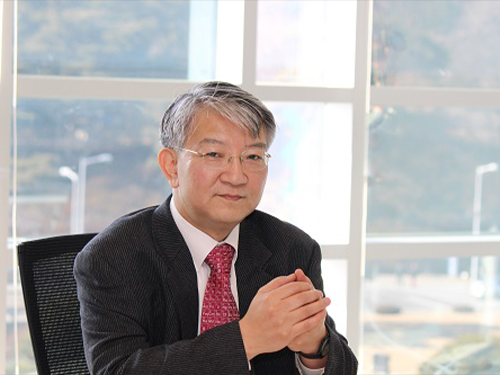 Distinguished Professor Lee Elected to the NAS
Distinguished Professor Sang Yup Lee of the Department of Chemical and Biomolecular Engineering was elected as a foreign associate to the US National Academy of Sciences (NAS) on May 2. The National Academy of Sciences elected 84 new members and 21 foreign associates in recognition of their distinguished and continuing achievements in their original research. Election to the Academy is widely regarded as one of the highest honors that a scientist can receive.
Professor Lee was also elected in 2010 as a member of the US National Academy of Engineering (NAE) for his leadership in microbial biotechnology and metabolic engineering, including the development of fermentation processes for biodegradable polymers and organic acids. Until 2016, there are only 12 people worldwide who are foreign associates of both NAS and NAE.
He is the first Korean elected to both prestigious academies, the NAS and the NAE in the US. Professor Lee is currently the dean of KAIST Institutes, the world leading institute for multi-and interdisciplinary research. He is also serving as co-chair of the Global Council on Biotechnology and member of the Global Future Council on the Fourth Industrial Revolution, the World Economic Forum.
2017.05.16 View 10222
Distinguished Professor Lee Elected to the NAS
Distinguished Professor Sang Yup Lee of the Department of Chemical and Biomolecular Engineering was elected as a foreign associate to the US National Academy of Sciences (NAS) on May 2. The National Academy of Sciences elected 84 new members and 21 foreign associates in recognition of their distinguished and continuing achievements in their original research. Election to the Academy is widely regarded as one of the highest honors that a scientist can receive.
Professor Lee was also elected in 2010 as a member of the US National Academy of Engineering (NAE) for his leadership in microbial biotechnology and metabolic engineering, including the development of fermentation processes for biodegradable polymers and organic acids. Until 2016, there are only 12 people worldwide who are foreign associates of both NAS and NAE.
He is the first Korean elected to both prestigious academies, the NAS and the NAE in the US. Professor Lee is currently the dean of KAIST Institutes, the world leading institute for multi-and interdisciplinary research. He is also serving as co-chair of the Global Council on Biotechnology and member of the Global Future Council on the Fourth Industrial Revolution, the World Economic Forum.
2017.05.16 View 10222 -
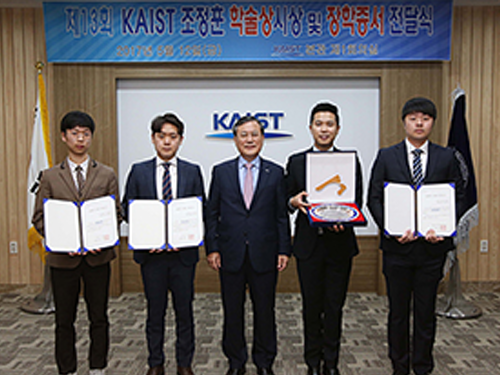 Dr. Zi Jing Wong Named 2017 Jeong Hun Cho Awardee
(Photo caption: The 2017 Jeong Hun Cho Scholarship recipients pose with President Shin (left photo) and Dr. Zi Jing Wong, the recipient of the 2017 Jeong Hun Cho Award)
Dr. Zi Jing Wong, a postdoctoral scholar at the University of California, Berkeley was named the 2017 recipient of the Jeong Hun Cho Award. The award recognizes outstanding young scientists in the field of aerospace engineering annually. The recipient receives a 20 million KRW prize.
The Award Committee said that Dr. Wong who earned his MS at KAIST Department of Aerospace Engineering is a rising scholar in the fields of optic meta materials, photonics, imaging, among others. He has published five papers on the realization of a zero refractive index and the control of a refractive index, as well as the realization of a 3D invisibility cloak in Science and Nature Photonics in 2014 and 2015. Dr. Wong also swept the best paper awards from many international academic societies including the US Materials Research Society, IEEE, SPIE, and Metamaterials Congress in 2015. He finished his Ph.D. at the University of California, Berkeley.
The Award Committee also named three recipients of the Jeong Hun Cho Scholarship: Ph.D. candidate Hyon-Tak Kim of the Department of Aerospace Engineering at KAIST, Ph.D. candidate Ho-Song Park from the Department of Mechanical Engineering at Korea University, and Hyong-Jin Choi of Kongju National University High School.
The award was endowed by the family of the late Ph.D. candidate Jeong Hun Cho who died in a rocket lab accident in the Department of Aerospace Engineering in 2003. Cho was posthumously conferred an honorary doctorate degree.
In memory of Cho, his father established the ‘Jeong Hun Cho Award and Scholarship.’ The scholarship annually selects three young scholars from Cho’s alma maters of KAIST, Korea University, and Kongju National University High School.
2017.05.12 View 12073
Dr. Zi Jing Wong Named 2017 Jeong Hun Cho Awardee
(Photo caption: The 2017 Jeong Hun Cho Scholarship recipients pose with President Shin (left photo) and Dr. Zi Jing Wong, the recipient of the 2017 Jeong Hun Cho Award)
Dr. Zi Jing Wong, a postdoctoral scholar at the University of California, Berkeley was named the 2017 recipient of the Jeong Hun Cho Award. The award recognizes outstanding young scientists in the field of aerospace engineering annually. The recipient receives a 20 million KRW prize.
The Award Committee said that Dr. Wong who earned his MS at KAIST Department of Aerospace Engineering is a rising scholar in the fields of optic meta materials, photonics, imaging, among others. He has published five papers on the realization of a zero refractive index and the control of a refractive index, as well as the realization of a 3D invisibility cloak in Science and Nature Photonics in 2014 and 2015. Dr. Wong also swept the best paper awards from many international academic societies including the US Materials Research Society, IEEE, SPIE, and Metamaterials Congress in 2015. He finished his Ph.D. at the University of California, Berkeley.
The Award Committee also named three recipients of the Jeong Hun Cho Scholarship: Ph.D. candidate Hyon-Tak Kim of the Department of Aerospace Engineering at KAIST, Ph.D. candidate Ho-Song Park from the Department of Mechanical Engineering at Korea University, and Hyong-Jin Choi of Kongju National University High School.
The award was endowed by the family of the late Ph.D. candidate Jeong Hun Cho who died in a rocket lab accident in the Department of Aerospace Engineering in 2003. Cho was posthumously conferred an honorary doctorate degree.
In memory of Cho, his father established the ‘Jeong Hun Cho Award and Scholarship.’ The scholarship annually selects three young scholars from Cho’s alma maters of KAIST, Korea University, and Kongju National University High School.
2017.05.12 View 12073 -
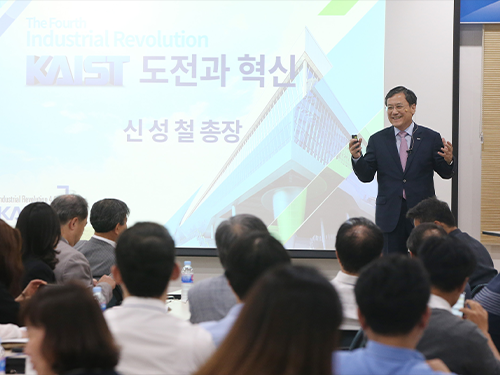 Policy Debate Series for Industry 4.0
(Photo caption: President Shin takes the podium as the first speaker of a year-long monthly policy dabate series on Industry 4.0 on May 11.)
KAIST will kick off a monthly policy debate series on Industry 4.0 every Thursday from May 11 at the Startup KAIST building. The year-long series, featuring professors from key technology fields associated with Industry 4.0, is designed to help policy makers from government, industry, and research institutes respond better to the ramifications that Industry 4.0 brings about in each sector.
The series will help them establish the vision and strategy that will work for the new industrial environment to take the lead in the new industrial era.
Twelve professors, including President Sung-Chul Shin, from departments that are researching emerging technologies will speak on the megatrend of new technology, while facilitating debates and Q& A sessions with participants.
The participants will include officials from the government complexes in Sejong and Daejeon cities, government-funded research institutes in Daejeon, and businessmen, among others. For registration, please go to https://startup.kaist.ac.kr/register.
Schedule
Speaker
Theme
May 11
President Sung-Chul Shin
Challenges and Innovations of KAIST in the Era of Industry 4.0
June 8
Professor Jonghwan Kim
Machine Intelligence and Deep Learning
July 6
Professor Jun Ho Oh
Robot Technology and the Future
Aug. 3
Professor Hyunchul Shim
Unmanned Vehicle Technology and Industry 4.0
Sept. 7
Professor Hawoong Jeong
Complex Systems and Data Science
Oct. 12
Professor Yongdae Kim
Technology, Policy, and the Fostering of Talents: Industry 4.0 and Information Protection
Nov. 9
Professor Sang Yup Lee
The Role of Biotechnology in Industry 4.0
Dec. 7
Professor Meeyoung Cha
AI-Based Research for Fake News Detection
2018 Jan. 4
Professor Joungho Kim
Innovation for the Korean Semiconductor Industry: Kim’s Law
Feb. 8
Professor Jaekyun Moon
Education for Industry 4.0
March 8
Professor Sang Kil Cha
Artificial Intelligence Cyber Warfare: Its Present and Future
April 5
Professor Jaeseung Jeong
The Future of Brain Engineering and Artificial Intelligence
2017.05.08 View 10981
Policy Debate Series for Industry 4.0
(Photo caption: President Shin takes the podium as the first speaker of a year-long monthly policy dabate series on Industry 4.0 on May 11.)
KAIST will kick off a monthly policy debate series on Industry 4.0 every Thursday from May 11 at the Startup KAIST building. The year-long series, featuring professors from key technology fields associated with Industry 4.0, is designed to help policy makers from government, industry, and research institutes respond better to the ramifications that Industry 4.0 brings about in each sector.
The series will help them establish the vision and strategy that will work for the new industrial environment to take the lead in the new industrial era.
Twelve professors, including President Sung-Chul Shin, from departments that are researching emerging technologies will speak on the megatrend of new technology, while facilitating debates and Q& A sessions with participants.
The participants will include officials from the government complexes in Sejong and Daejeon cities, government-funded research institutes in Daejeon, and businessmen, among others. For registration, please go to https://startup.kaist.ac.kr/register.
Schedule
Speaker
Theme
May 11
President Sung-Chul Shin
Challenges and Innovations of KAIST in the Era of Industry 4.0
June 8
Professor Jonghwan Kim
Machine Intelligence and Deep Learning
July 6
Professor Jun Ho Oh
Robot Technology and the Future
Aug. 3
Professor Hyunchul Shim
Unmanned Vehicle Technology and Industry 4.0
Sept. 7
Professor Hawoong Jeong
Complex Systems and Data Science
Oct. 12
Professor Yongdae Kim
Technology, Policy, and the Fostering of Talents: Industry 4.0 and Information Protection
Nov. 9
Professor Sang Yup Lee
The Role of Biotechnology in Industry 4.0
Dec. 7
Professor Meeyoung Cha
AI-Based Research for Fake News Detection
2018 Jan. 4
Professor Joungho Kim
Innovation for the Korean Semiconductor Industry: Kim’s Law
Feb. 8
Professor Jaekyun Moon
Education for Industry 4.0
March 8
Professor Sang Kil Cha
Artificial Intelligence Cyber Warfare: Its Present and Future
April 5
Professor Jaeseung Jeong
The Future of Brain Engineering and Artificial Intelligence
2017.05.08 View 10981